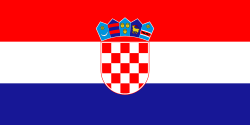Corruption in Croatia describes the prevention and occurrence of corruption in Croatia. As of the early 2020s, Croatia has severe problems with systemic and political corruption. Among European Union member states, it is generally ranked as one of the five most corrupt states.
Contents
To qualify as a member of the European Union, Croatia has taken various measures to combat corruption. The legal and institutional framework, as well as government agencies, are addressing the issue of corruption in a much larger scale, and the inter-agency cooperation for corruption prevention has also increased, but these efforts are facing the large obstacle of an inefficient and corrupt judicial system. [1] USKOK has prosecuted 2,000 individuals and achieved a 95% conviction rate (2012) (although convictions rarely resulted in prison sentences), including former Prime Minister Ivo Sanader. [2] [3]
Several civil servants in the Croatian Privatization Fund, the Zagreb land registry and the Zagreb taxation headquarters, among others, were arrested on charges of bribery. Moreover, several high-profile corruption cases have come to light, including investigations of a former defense minister and a former deputy prime minister. [4]
A 2013 Global Corruption Barometer report by Transparency International showed that 41% of respondents believe that the level of corruption increased in Croatia. [5]
Transparency International's 2024 Corruption Perceptions Index scored the country at 47 on a scale from 0 ("highly corrupt") to 100 ("very clean"). When ranked by score, Croatia ranked 63rd among the 180 countries in the Index, where the country ranked first is perceived to have the most honest public sector. [6] For comparison with regional scores, the best score among Western European and European Union countries [Note 1] was 90, the average score was 64 and the worst score was 41. [7] For comparison with worldwide scores, the best score was 90 (ranked 1), the average score was 43, and the worst score was 8 (ranked 180). [8]
